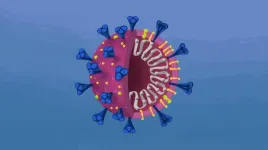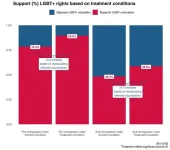(Press-News.org) New UC Riverside research has revealed COVID’s Achilles heel — its dependence on key human proteins for its replication — which can be used to prevent the virus from making people sick.
In a new paper published in the journal Viruses, the UCR research team describes an important discovery. The protein in COVID that enables the virus to make copies of itself, called N, requires the help of human cells to perform its job.
Genetic instructions in our cells are transcribed from DNA to messenger RNA, and then translated into proteins that enable functions such as growth and communication with other cells. Following this translation event, proteins often need additional modifications by enzymes. These so-called post-translation modifications ensure that proteins are uniquely suited to perform their intended tasks.
COVID takes advantage of a human post-translation process called SUMOylation, which directs the virus’ N protein to the right location for packaging its genome after infecting human cells. Once in the right place, the protein can begin putting copies of its genes into new infectious virus particles, invading more of our cells, and making us sicker.
“In the wrong location, the virus cannot infect us,” said Quanqing Zhang, co-author of the new study and manager of the proteomics core laboratory at UCR’s Institute for Integrative Genome Biology.
Proteomics is the study of all the proteins that an organism makes, how they are modified by other enzymes, and the roles they play in a living organism. “If someone gets an infection, maybe one of his or her proteins will appear differently than it was before. That’s what we’re looking for in our facility,” Zhang said.
In this case, the team designed and conducted experiments that made COVID proteins’ post-translational modifications easy to see. “We used fluorescent glow to show us where the virus is interacting with human proteins and making new virions — infectious viral particles,” said UCR bioengineering professor and corresponding paper author Jiayu Liao.
“This method is more sensitive than other techniques and gives us a more comprehensive view of all the interactions between the human and viral proteins,” he said.
Using similar methods, the bioengineering team previously discovered that the two most common types of flu virus, Influenza A and Influenza B, require the same post-translational SUMOylation modification in order to replicate.
This paper shows that COVID depends on SUMOylation proteins, just as the flu does. Blocking access to the human proteins would allow our immune systems to kill the virus.
Currently the most effective treatment for COVID is Paxlovid, which inhibits virus replication. But patients need to take it within three days following infection. “If you take it after that it won’t be so effective,” Liao said. “A new medication based on this discovery would be useful to patients at all stages of infection.”
The similarities between viruses may enable a whole new class of antiviral medication. With sufficient support, Liao estimates these can be developed within five years.
“I think other viruses might work this way as well,” Liao said. “Ultimately, we would like to block the flu as well as COVID, and potentially other viruses such as RSV and Ebola. We are making new discoveries to help make this happen,” Liao said.
END
Scientists uncover COVID’s weakness
Without key proteins, virus cannot infect people
2023-09-13
ELSE PRESS RELEASES FROM THIS DATE:
UMass Amherst and Embr Labs develop ‘digital drug’ to predict hot flashes
2023-09-13
Researchers at the University of Massachusetts Amherst’s Institute for Applied Life Sciences (IALS) and Embr Labs have created a machine-learning algorithm to predict a hot flash before a person perceives it.
When combined with Embr Labs’ patented wearable device, Embr Wave™, immediate cooling is delivered to mitigate or fully alleviate the event. This first-of-its-kind predictive algorithm is the result of machine learning being applied to the largest data set of digital biomarkers for hot flashes ever collected, which was generated by researchers at UMass Amherst’s Center for Human ...
Socioeconomic status may be an uneven predictor of heart health
2023-09-13
Research Highlights:
The benefits of four measures of socioeconomic status (education, income, employment status and health insurance) on ideal heart health were greater for non-Hispanic white adults compared to Black, Hispanic and Asian adults in the U.S.
The new diverse representative study suggests heart disease prevention efforts should address other non-biological factors that drive cardiovascular health and not rely solely on reducing socioeconomic disparities by race or ethnic group.
Embargoed until 4 a.m. CT/5 a.m. ET Wednesday, Sept. 13, 2023
DALLAS, ...
No increase in cancer risk for most patients with reflux disease
2023-09-13
Reflux disease manifests as acid regurgitation and heartburn and is a known risk factor for oesophageal cancer. However, a new study published in The BMJ by researchers at Karolinska Institutet now reports that the majority of patients do not have a higher risk of cancer. A large-scale study from three Nordic countries shows that the cancer risk is only elevated in patients whom gastroscopy reveals to have changes in the oesophageal mucosa.
“This is a gratifying result since reflux disease is a very common condition and most patients are found to have a completely normal mucus membrane on gastroscopic examination,” says the study’s ...
Study uncovers link between anti-immigrant prejudices and support for LGBT+ rights
2023-09-13
Cross-national research carried out by the University of Southampton and Vrije Universiteit Amsterdam (VUA) into public opinion on LGBT+ rights has shown that anti-immigrant prejudices, particularly towards Muslims, contributes to explaining some of the widespread shifts in tolerance towards the LGBT+ community. Findings of a new study show this was especially evident among socially conservative voters.
The rise of tolerance towards LGBT+ individuals in Western democracies could be seen as remarkable, according to the researchers. Whereas a majority of citizens rejected the idea of same-sex marriage a couple of decades ago, a majority of ...
Rapid acting, oral vaccines are coming soon
2023-09-13
A new paper in Biology Methods and Protocols, published by Oxford University Press, indicates that researchers studying SARS-CoV-2 may have developed new methods to administer vaccines orally, which would be both easier to administer and more effective at combatting illnesses.
The best way to neutralize viruses is before they can enter inside human cells but are only on the external surface of epithelial cells that line and produce mucus in the lungs, nose, and mouth. A specific class of antibodies known as Immunoglobulin A operate in mucus and can disable viruses. However, production of specific immunoglobulins/antibodies for a ...
Certain proteins in breast milk found to be essential for a baby’s healthy gut
2023-09-13
More than 320 million years of mammalian evolution has adapted breast milk to meet all the physiological needs of babies: it contains not only nutrients, but also hormones, antimicrobials, digestive enzymes, and growth factors. Furthermore, many of the proteins in breast milk, for example casein and milk fat globule membrane proteins, aren’t just sources of energy and molecular building blocks, but also directly stimulate immunity, at least under preclinical conditions.
Likewise, the gut microbiome, composed of bacteria, archaea, and fungi, plays a vital role in the regulation of the immune system. This raises the possibility that the immune-boosting function ...
AACR Cancer Progress Report details exciting advances in cancer research and treatment
2023-09-13
PHILADELPHIA – Today, the American Association for Cancer Research (AACR) released the 13th edition of its annual Cancer Progress Report, which chronicles how basic, translational, and clinical cancer research and cancer-related population sciences—primarily supported by federal investments in the National Institutes of Health (NIH) and the National Cancer Institute (NCI)—remain vitally important to improving health and saving lives.
In addition to providing the latest statistics on cancer incidence, mortality, and survivorship, the AACR Cancer Progress Report 2023 offers detailed updates and important ...
Pitt surveillance system detected infection linked to eye drops months before outbreak declared
2023-09-13
An infectious diseases surveillance system created by University of Pittsburgh School of Medicine scientists and deployed at a UPMC hospital successfully flagged cases of a drug-resistant infection spread by eye drops months before national public health officials announced an outbreak.
The findings, published today in The Journal of Infectious Diseases, were obtained through a hospital-based program called Enhanced Detection System for Healthcare-Associated Transmission (EDS-HAT). They demonstrate the potential of this technology to detect and stop nationwide outbreaks sooner.
“Our study really showcases the utility of whole genome sequencing surveillance,” ...
Early ovary removal likely to accelerate aging process and health problems
2023-09-13
CLEVELAND, Ohio (Sept 13, 2023)—Increasing concerns regarding potentially harmful long-term effects of premenopausal bilateral oophorectomy (PBO) have caused a decline in the number of women choosing to proactively remove both ovaries as a precaution to protect against ovarian cancer. A new study identified specific chronic medical conditions, such as asthma and arthritis, associated with the procedure. Results of the study are published online today in Menopause, the journal of The Menopause Society.
Hysterectomy is the second-most-frequently performed surgical operation for women after cesarean ...
Discovery of two potential Polar Ring galaxies suggests these stunning rare clusters might be more common than previously believed.
2023-09-13
KINGSTON, September 13, 2023 – A group of international astronomers, including researchers from Queen’s University, has identified two potential polar ring galaxies, according to results published today in the Monthly Notices of the Royal Astronomical Society.
Queen’s researchers Nathan Deg and Kristine Spekkens (Physics, Engineering Physics & Astronomy) led the analysis of data obtained using a telescope owned and operated by CSIRO, Australia’s national science agency. Looking at ...
LAST 30 PRESS RELEASES:
Kidney cancer study finds belzutifan plus pembrolizumab post-surgery helps patients at high risk for relapse stay cancer-free longer
Alkali cation effects in electrochemical carbon dioxide reduction
Test platforms for charging wireless cars now fit on a bench
$3 million NIH grant funds national study of Medicare Advantage’s benefit expansion into social supports
Amplified Sciences achieves CAP accreditation for cutting-edge diagnostic lab
Fred Hutch announces 12 recipients of the annual Harold M. Weintraub Graduate Student Award
Native forest litter helps rebuild soil life in post-mining landscapes
Mountain soils in arid regions may emit more greenhouse gas as climate shifts, new study finds
Pairing biochar with other soil amendments could unlock stronger gains in soil health
Why do we get a skip in our step when we’re happy? Thank dopamine
UC Irvine scientists uncover cellular mechanism behind muscle repair
Platform to map living brain noninvasively takes next big step
Stress-testing the Cascadia Subduction Zone reveals variability that could impact how earthquakes spread
We may be underestimating the true carbon cost of northern wildfires
Blood test predicts which bladder cancer patients may safely skip surgery
Kennesaw State's Vijay Anand honored as National Academy of Inventors Senior Member
Recovery from whaling reveals the role of age in Humpback reproduction
Can the canny tick help prevent disease like MS and cancer?
Newcomer children show lower rates of emergency department use for non‑urgent conditions, study finds
Cognitive and neuropsychiatric function in former American football players
From trash to climate tech: rubber gloves find new life as carbon capturers materials
A step towards needed treatments for hantaviruses in new molecular map
Boys are more motivated, while girls are more compassionate?
Study identifies opposing roles for IL6 and IL6R in long-term mortality
AI accurately spots medical disorder from privacy-conscious hand images
Transient Pauli blocking for broadband ultrafast optical switching
Political polarization can spur CO2 emissions, stymie climate action
Researchers develop new strategy for improving inverted perovskite solar cells
Yes! The role of YAP and CTGF as potential therapeutic targets for preventing severe liver disease
Pancreatic cancer may begin hiding from the immune system earlier than we thought
[Press-News.org] Scientists uncover COVID’s weaknessWithout key proteins, virus cannot infect people





